Readings Newsletter
Become a Readings Member to make your shopping experience even easier.
Sign in or sign up for free!
You’re not far away from qualifying for FREE standard shipping within Australia
You’ve qualified for FREE standard shipping within Australia
The cart is loading…






With contributions from spiritual scholars such as William C. Chittick, BeverlyLanzetta, R. McDermott, and Donald Rothberg, this discussion proposes a new approach for studying religion, spirituality, and mysticism: the participatory turn, which holds that individuals and communities have an integral role to play in creating distinct but equally legitimate spiritual experiences, discoveries, and realities. Responding to questions such as Is there only one spiritual reality, or many? Are there different types of spiritual liberation? What is the role of ethics in interreligious dialogue? and How can different religious truths be evaluated?, this argument demonstrates the validity of every religion and spiritual tradition without resorting to simplistic relativisms or conventional reductionism. The first part of the book situates the participatory turn in the context of contemporary religious studies, while the second part shows how the approach can be applied to various global traditions, including Christianity, Hinduism, Sufism, and socially engaged Buddhism. Con contribuciones de eruditos espirituales como William C. Chittick, BeverlyLanzetta, R. McDermott
y Donald Rothberg, esta discusion propone un nuevo enfoque para estudiar la religion, la espiritualidad y el misticismo: el giro participativo, el cual sostiene que los individuos y las comunidades desempenan un papel integro en la creacion de experiencias, realizaciones y realidades espirituales distintas pero igual de legitimas. Abordando preguntas como
Existe una sola realidad espiritual o muchas? Hay distintos tipos de liberacion espiritual? Cual es el lugar de la etica en el dialogo interreligioso? y
Como se pueden evaluar las verdades religiosas?, este argumento demuestra la validez de cada religion y tradicion espiritual sin caer en relativismos simplistas o el reduccionismo convencional. La primera parte del libro situa el giro participativo en el contexto de los estudios religiosos actuales, mientras que la segunda parte explica como este enfoque se puede aplicar a diversas tradiciones globales, incluyendo el cristianismo, el hinduismo, el sufismo y el budismo socialmente consciente.
$9.00 standard shipping within Australia
FREE standard shipping within Australia for orders over $100.00
Express & International shipping calculated at checkout
With contributions from spiritual scholars such as William C. Chittick, BeverlyLanzetta, R. McDermott, and Donald Rothberg, this discussion proposes a new approach for studying religion, spirituality, and mysticism: the participatory turn, which holds that individuals and communities have an integral role to play in creating distinct but equally legitimate spiritual experiences, discoveries, and realities. Responding to questions such as Is there only one spiritual reality, or many? Are there different types of spiritual liberation? What is the role of ethics in interreligious dialogue? and How can different religious truths be evaluated?, this argument demonstrates the validity of every religion and spiritual tradition without resorting to simplistic relativisms or conventional reductionism. The first part of the book situates the participatory turn in the context of contemporary religious studies, while the second part shows how the approach can be applied to various global traditions, including Christianity, Hinduism, Sufism, and socially engaged Buddhism. Con contribuciones de eruditos espirituales como William C. Chittick, BeverlyLanzetta, R. McDermott
y Donald Rothberg, esta discusion propone un nuevo enfoque para estudiar la religion, la espiritualidad y el misticismo: el giro participativo, el cual sostiene que los individuos y las comunidades desempenan un papel integro en la creacion de experiencias, realizaciones y realidades espirituales distintas pero igual de legitimas. Abordando preguntas como
Existe una sola realidad espiritual o muchas? Hay distintos tipos de liberacion espiritual? Cual es el lugar de la etica en el dialogo interreligioso? y
Como se pueden evaluar las verdades religiosas?, este argumento demuestra la validez de cada religion y tradicion espiritual sin caer en relativismos simplistas o el reduccionismo convencional. La primera parte del libro situa el giro participativo en el contexto de los estudios religiosos actuales, mientras que la segunda parte explica como este enfoque se puede aplicar a diversas tradiciones globales, incluyendo el cristianismo, el hinduismo, el sufismo y el budismo socialmente consciente.